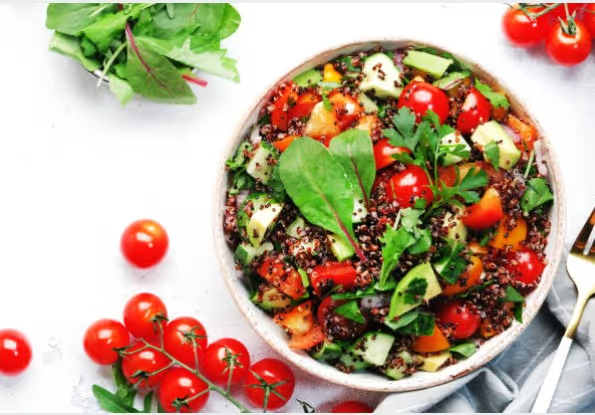November 1, 2023
Share:
Celebrating World Vegan Day with GenCare - Tips & a Delicious Recipe to Enjoy!
As the holidays approach, many of us may be looking forward to our traditional meat dishes like stuffed turkey for Thanksgiving, a brisket for Hannukah, and a nice ham for Christmas. Soon after, we often think of New Year’s resolutions and consider healthy lifestyle changes that may help us feel a bit better. One such change might be to increase the number of plant-based dishes we enjoy throughout the year.
At GenCare Lifestyle, we annually celebrate World Vegan Day on November 1st.Although our culinary teams accommodate meat eaters every day, they also offer nice array of vegan dishes for residents who want to increase their vegetable intake, have chosen to remain meat-free to improve the environment, or simply want to show compassion to animals.
In this blog, we’ll list the health benefits of increasing plant-based meals, provide details on how older adults can avoid nutrient deficiencies if they choose to skip the meat and offer a very easy vegan recipe, we hope you enjoy!
Benefits of a Vegan Diet
1. Antioxidants
Including a great number of fruits, vegetables, legumes, whole grains, nuts, seeds, and healthy oils can offer your body a wide variety of antioxidants, which have anti-inflammatory properties that are linked to better health.
2. Increased Fiber
Plant-based foods generally have great amounts of fiber, which helps prevent constipation, lowers LDL (bad)cholesterol, and controls blood sugar and weight.
3. Lower Saturated Fat
Typically, meat eaters have higher saturated fat when compared with plant-based eaters.

Tips to Avoid Nutrient Deficiencies
It’s important to work with a medical team to determine if a vegan diet is right for you. They will be able to offer more insight, including specific amounts of the following nutrients you need to feel your best:
1. Essential fatty acids:
A lack of essential fatty acids can cause problems related to brain health, such as cognitive impairment and depression. Fatty acids are in whole grains and leafy green vegetables. Also, try snacking on a small handful of unsalted nuts, like almonds, walnuts, or pistachios.
2. Iron:
Red meat and egg yolks are great sources of iron—but are also high in cholesterol. Good plant sources of iron include black-eyed peas, tofu, and dried fruits.
3. Vitamin D:
Ten to 15 minutes of sunlight exposure a day can give you a vitamin D boost, as can fortified orange juice and soy.
4. Calcium
Plant-based diets can be dangerously low in calcium if the right foods aren’t chosen. Almonds, dark leafy greens, figs, tofu, and oranges are all rich in calcium.
5. Protein
Meat is always an easy source of high protein. If we’re not eating meat, we risk a protein deficiency. Replace meat with protein-rich plant foods: soy products (tofu, tempeh, and edamame), legumes (beans, lentils), nuts (walnuts, almonds), chia seeds, and spirulina (blue or green algae). You need about 7 grams of protein daily for every 20pounds of body weight.
6. Vitamin B12
B12-enriched vegan foods such as fortified plant milks (like almond or soy milk) or fortified cereals are great sources of B12.

Celebrate World Vegan Day by trying this easy recipe!
Vegan Recipe: High Protein Vegan Grain Bowls
1. A basic grain bowl starts with your choice of one or two grains and the options are nearly endless!
Grain examples: rice, quinoa, wheat berries, farro, etc.
2. Next, choose a couple of your favorite vegetables. There are no rules when it comes to which vegetables to add. Try roasting some using your favorite seasonings to spice up your grain bowl. You can also add some raw vegetables.
Vegetables examples: broccoli, green peas, spinach, kale, tomatoes, carrots, cucumbers, etc.
3. Then add your vegan protein. Beans and legumes, or other high-protein products like tofu are great options. Again, choose what sounds good to you!
Protein examples: beans, lentils, legumes, tofu, tempeh, seitan
4. Finally, adding a sauce of some sort can make your meal even more interesting.
Sauce examples: Try peanut sauce or one of your favorite dressings!
Before changing your typical diet, get the okay from your medical team and seek advice from a registered dietitian, who can tailor an eating plan to your nutritional needs.
To learn more about how GenCare Lifestyle can help you or your loved one rejuvenate your mind, body, and soul with our signature Whole Life Living program, stop by, call, or schedule a personalized tour today!
Written by: Candace Snapp
Corporate Director of Vitality



